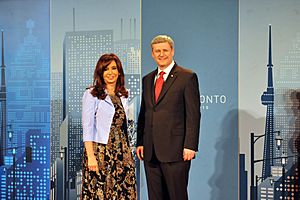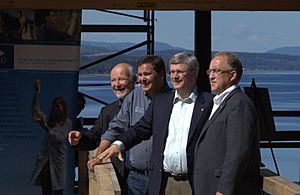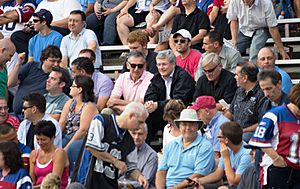Stephen Harper facts for kids
Quick facts for kids
Stephen Harper
|
|||||||||||||||||||||||||||||||||||||||||||||||||||||||||
|---|---|---|---|---|---|---|---|---|---|---|---|---|---|---|---|---|---|---|---|---|---|---|---|---|---|---|---|---|---|---|---|---|---|---|---|---|---|---|---|---|---|---|---|---|---|---|---|---|---|---|---|---|---|---|---|---|---|
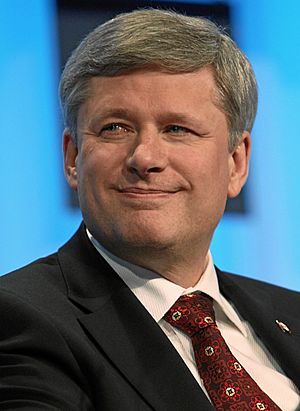
Harper in 2010
|
|||||||||||||||||||||||||||||||||||||||||||||||||||||||||
| 22nd Prime Minister of Canada | |||||||||||||||||||||||||||||||||||||||||||||||||||||||||
| In office February 6, 2006 – November 4, 2015 |
|||||||||||||||||||||||||||||||||||||||||||||||||||||||||
| Monarch | Elizabeth II | ||||||||||||||||||||||||||||||||||||||||||||||||||||||||
| Governor General | |||||||||||||||||||||||||||||||||||||||||||||||||||||||||
| Preceded by | Paul Martin | ||||||||||||||||||||||||||||||||||||||||||||||||||||||||
| Succeeded by | Justin Trudeau | ||||||||||||||||||||||||||||||||||||||||||||||||||||||||
| Chairman of the International Democracy Union |
|||||||||||||||||||||||||||||||||||||||||||||||||||||||||
| Assumed office February 21, 2018 |
|||||||||||||||||||||||||||||||||||||||||||||||||||||||||
| Preceded by | John Key | ||||||||||||||||||||||||||||||||||||||||||||||||||||||||
|
|||||||||||||||||||||||||||||||||||||||||||||||||||||||||
| Personal details | |||||||||||||||||||||||||||||||||||||||||||||||||||||||||
| Born |
Stephen Joseph Harper
April 30, 1959 Toronto, Ontario, Canada |
||||||||||||||||||||||||||||||||||||||||||||||||||||||||
| Political party | Conservative (since 2003) | ||||||||||||||||||||||||||||||||||||||||||||||||||||||||
| Other political affiliations |
|
||||||||||||||||||||||||||||||||||||||||||||||||||||||||
| Spouse | |||||||||||||||||||||||||||||||||||||||||||||||||||||||||
| Children | 2 | ||||||||||||||||||||||||||||||||||||||||||||||||||||||||
| Residences | Calgary, Alberta, Canada | ||||||||||||||||||||||||||||||||||||||||||||||||||||||||
| Alma mater |
|
||||||||||||||||||||||||||||||||||||||||||||||||||||||||
| Signature |  |
||||||||||||||||||||||||||||||||||||||||||||||||||||||||
Stephen Joseph Harper PC CC AOE (born April 30, 1959) is a Canadian politician who served as the 22nd prime minister of Canada from 2006 to 2015. Harper is the first and only prime minister to come from the modern-day Conservative Party of Canada, serving as the party's first leader from 2004 to 2015.
In the 2015 federal election, the Conservative Party lost power to the Liberal Party led by Justin Trudeau. Harper officially stepped down as party leader on October 19, 2015, and resigned his seat on August 26, 2016. Since then, Harper has taken on a number of international business and leadership roles, founding a global consulting firm, appearing in US and British media, and being elected leader of the International Democrat Union.
Contents
- Early life and education
- Political beginnings
- Reform MP (1993–1997)
- Out of parliament
- Canadian Alliance leadership, 2002–2003
- Conservative Party leadership, 2004–2006
- Prime Minister of Canada (2006–2015)
- Supreme Court appointments
- Conservative backbencher (2015–2016)
- After politics (2016–present)
- Honours
- Honorary degrees
- Personal life
- Electoral record
- See also
Early life and education
Harper was born and raised in Leaside, a neighbourhood of Toronto, Ontario, the first of three sons of Margaret (née Johnston) and Joseph Harris Harper, an accountant at Imperial Oil. The Harper family traces its ancestral roots back to Yorkshire, England, with Christopher Harper having emigrated to Nova Scotia in 1784, where he later served as justice of the peace in the area that is now New Brunswick.
Harper attended Northlea Public School and, later, John G. Althouse Middle School and Richview Collegiate Institute, both in Etobicoke, Toronto. He graduated from high school in 1978, and was a member of Richview Collegiate's team on Reach for the Top, a televised academic quiz show for high school students. Harper studied at the University of Toronto's Trinity College before moving to Alberta. In an attempt to establish independence from his parents, Harper dropped out of the University of Toronto and then moved to Edmonton, Alberta, where he found work in the mail room at Imperial Oil. Later, he advanced to work on the company's computer systems. He took up post-secondary studies again at the University of Calgary, where he completed a bachelor's degree in economics in 1985. He later returned there to earn a master's degree in economics, completed in 1991. Throughout his career, Harper has kept strong links to the University of Calgary. Trained as an economist, Harper was the first prime minister with an economics degree since Pierre Trudeau and the first prime minister without a law degree since Joe Clark.
Political beginnings
Harper became involved in politics as a member of his high school's Young Liberals club. He later changed his political allegiance because he disagreed with the National Energy Program (NEP) of Pierre Trudeau's Liberal government. He became executive assistant to Progressive Conservative (PC) Member of Parliament (MP) Jim Hawkes in 1985 but later became disillusioned with the party and the government of Brian Mulroney, citing the administration's economic policy. He left the PC Party the next year.
Harper was then recommended by the University of Calgary's economist Bob Mansell to Preston Manning, the founder and leader of the right-wing populist Reform Party of Canada. At that time Harper "didn't see himself as a politician", Mansell told CBC News in 2002, adding, "Politics was not his first love."
Manning invited him to participate in the party, and Harper gave a speech at Reform's 1987 founding convention in Winnipeg. He became the Reform Party's chief policy officer, and he played a major role in drafting the 1988 election platform, otherwise known as the Blue Book, which helped form the principles and policies of the party. Harper was influenced by his political mentor, Tom Flanagan, when writing the book. Harper is credited with creating Reform's campaign slogan, "The West wants in!"
Harper ran for the House of Commons in the 1988 federal election in Calgary West and losing by a wide margin to Hawkes, his former employer. After Reform candidate Deborah Grey was elected as the party's first MP in a 1989 by-election, Harper became Grey's executive assistant, serving as her chief adviser and speechwriter until 1993. He remained prominent in the Reform Party's national organization in his role as policy chief, encouraging the party to expand beyond its Western base and arguing that strictly regional parties were at risk of being taken over by radical elements. He delivered a speech at the Reform Party's 1991 national convention, in which he condemned extremist views.
Harper's relationship with Manning became strained in 1992, because of conflicting strategies over the Charlottetown Accord. Harper opposed the accord on principle for ideological reasons, while Manning was initially more open to compromise. Harper also criticized Manning's decision to hire Rick Anderson as an adviser, believing that Anderson was not sufficiently committed to the Reform Party's principles. Harper resigned as the policy chief in October 1992.
Harper stood for office again in the 1993 federal election and defeated Jim Hawkes amid a significant Reform breakthrough in Western Canada. The National Citizens Coalition (NCC) ran a $50,000 print and television campaign against Hawkes but did not endorse Harper directly.
Reform MP (1993–1997)
Harper emerged a prominent member of the Reform Party caucus. He was active on constitutional issues and played a prominent role in drafting the Reform Party's strategy for the 1995 Quebec referendum. A long-standing opponent of centralized federalism, he stood with Preston Manning in Montreal to introduce a twenty-point plan to "decentralize and modernize" Canada in the event of a "no" victory. Harper later argued that the "no" side's narrow plurality was a worst-case scenario, in that no-one had won a mandate for change.
Harper has expressed some socially conservative views on certain issues. In 1994, he opposed plans by federal Justice Minister Allan Rock to introduce spousal benefits for same-sex couples. Citing the recent failure of a similar initiative in Ontario, he was quoted as saying, "What I hope they learn is not to get into it. There are more important social and economic issues, not to mention the unity question." Harper also spoke against the possibility of the Canadian Human Rights Commission or the Supreme Court changing federal policy in these and other matters.
At the Reform Party's 1994 policy convention, Harper was part of a small minority of delegates who voted against restricting the definition of marriage to "the union of one man and one woman". He opposed both same-sex marriage and mandated benefits for same-sex couples, but argued that political parties should refrain from taking official positions on these and other "issues of conscience".
Harper was the only Reform MP to support the creation of the Canadian Firearms Registry at second reading in 1995, although he later voted against it at third reading stage. He said at the time that he initially voted for the registry because of a poll showing that most of his constituents supported it, and added that he changed his vote when a second poll showed the opposite result. It was reported in April 1995, that some Progressive Conservatives opposed to Jean Charest's leadership wanted to remove both Charest and Manning, and unite the Reform and Progressive Conservative parties under Harper's leadership.
Despite his prominent position in the party, Harper's relationship with the Reform Party leadership was frequently strained. In early 1994, he criticized a party decision to establish a personal expense account for Manning at a time when other Reform MPs had been asked to forego parliamentary perquisites. He was formally rebuked by the Reform executive council despite winning support from some MPs. His relationship with Manning grew increasingly fractious in the mid-1990s, and he pointedly declined to express any opinion on Manning's leadership during a 1996 interview. This friction was indicative of a fundamental divide between the two men: Harper was strongly committed to conservative principles and opposed Manning's inclinations toward populism, which Harper saw as leading to compromise on core ideological matters.
These tensions culminated in late 1996 when Harper announced that he would not be a candidate in the next federal election. He resigned his parliamentary seat on January 14, 1997, the same day that he was appointed as a vice-president of the National Citizens Coalition (NCC), a conservative think-tank and advocacy group. He was promoted to NCC president later in the year.
In April 1997, Harper suggested that the Reform Party was drifting toward social conservatism and ignoring the principles of economic conservatism. The Liberal Party lost seats but managed to retain a narrow majority government in the 1997 federal election, while Reform made only modest gains.
Out of parliament
1997–2000
Soon after leaving Parliament, Harper and Tom Flanagan co-authored an opinion piece entitled "Our Benign Dictatorship", which argued that the Liberal Party only retained power through a dysfunctional political system and a divided opposition. Harper and Flanagan argued that national conservative governments between 1917 and 1993 were founded on temporary alliances between Western populists and Quebec nationalists, and were unable to govern because of their fundamental contradictions. The authors called for an alliance of Canada's conservative parties, and suggested that meaningful political change might require electoral reforms such as proportional representation. "Our Benign Dictatorship" also commended Conrad Black's purchase of the Southam newspaper chain, arguing that his stewardship would provide for a "pluralistic" editorial view to counter the "monolithically liberal and feminist" approach of the previous management.
Harper remained active in constitutional issues. He was a prominent opponent of the Calgary Declaration on national unity in late 1997, describing it as an "appeasement strategy" against Quebec nationalism. He called for federalist politicians to reject this strategy, and approach future constitutional talks from the position that "Quebec separatists are the problem and they need to be fixed". In late 1999, Harper called for the federal government to establish clear rules for any future Quebec referendum on sovereignty. Some have identified Harper's views as an influence on the Chrétien government's Clarity Act.
As president of the National Citizens Coalition (NCC) from 1998 to 2002, Harper launched an ultimately unsuccessful legal battle against federal election laws restricting third-party advertising. He led the NCC in several campaigns against the Canadian Wheat Board, and supported Finance Minister Paul Martin's 2000 tax cuts as a positive first step toward tax reform.
Harper considered campaigning for the Progressive Conservative Party leadership in 1998, after Jean Charest left federal politics. Among those encouraging his candidacy were senior aides to Ontario Premier Mike Harris, including Tony Clement and Tom Long. He eventually decided against running, arguing that it would "burn bridges to those Reformers with whom I worked for many years" and prevent an alliance of right-wing parties from taking shape. Harper was sceptical about the Reform Party's United Alternative initiative in 1999, arguing that it would serve to consolidate Manning's hold on the party leadership. He also expressed concern that the UA would dilute Reform's ideological focus.
2000–2001
When the United Alternative created the Canadian Alliance in 2000 as a successor party to Reform, Harper predicted that Stockwell Day would defeat Preston Manning for the new party's leadership. He expressed reservations about Day's abilities, however, and accused Day of "[making] adherence to his social views a litmus test to determine whether you're in the party or not". Harper endorsed Tom Long for the leadership, arguing that Long was best suited to take support from the Progressive Conservative Party. When Day placed first on the first ballot, Harper said that the Canadian Alliance was shifting "more towards being a party of the religious right".
After the death of Pierre Trudeau in 2000, Harper wrote an editorial criticizing Trudeau's policies as they affected Western Canada. He wrote that Trudeau "embraced the fashionable causes of his time, with variable enthusiasm and differing results", but "took a pass" on the issues that "truly defined his century". Harper subsequently accused Trudeau of promoting "unabashed socialism", and argued that Canadian governments between 1972 and 2002 had restricted economic growth through "state corporatism".
After the Canadian Alliance's poor showing in the 2000 election, Harper joined with other Western conservatives in co-authoring a document called the "Alberta Agenda". The letter called on Alberta to reform publicly funded health care, replace the Canada Pension Plan with a provincial plan and replace the Royal Canadian Mounted Police with a provincial police force. It became known as the "firewall letter", because it called on the provincial government to "build firewalls around Alberta" to stop the federal government from redistributing its wealth to less affluent regions. Alberta Premier Ralph Klein agreed with some of the letter's recommendations, but distanced himself from the "firewall" comments.
Harper also wrote an editorial in late 2000 arguing that Alberta and the rest of Canada were "embark[ing] on divergent and potentially hostile paths to defining their country". He said that Alberta had chosen the "best of Canada's heritage—a combination of American enterprise and individualism with the British traditions of order and co-operation" while Canada "appears content to become a second-tier socialistic country ... led by a second-world strongman appropriately suited for the task". He also called for a "stronger and much more autonomous Alberta", while rejecting calls for separatism. In the 2001 Alberta provincial election, Harper led the NCC in a "Vote Anything but Liberal" campaign. Some articles from this period described him as a possible successor to Klein.
Harper and the NCC endorsed a private school tax credit proposed by Ontario's Progressive Conservative government in 2001, arguing that it would "save about $7,000 for each student who does not attend a union-run public school". Education Minister Janet Ecker criticized this, saying that her government's intent was not to save money at the expense of public education.
Day's leadership of the Canadian Alliance became increasingly troubled throughout the summer of 2001, as several party MPs called for his resignation. In June, the National Post newspaper reported that former Reform MP Ian McClelland was organizing a possible leadership challenge on Harper's behalf. Harper announced his resignation from the NCC presidency in August 2001, to prepare a campaign.
Canadian Alliance leadership, 2002–2003
Stockwell Day called a new Canadian Alliance leadership race for 2002, and soon declared himself a candidate. Harper emerged as Day's main rival, and declared his own candidacy on December 3, 2001. He eventually won the support of at least 28 Alliance MPs, including Scott Reid, James Rajotte and Keith Martin. During the campaign, Harper reprised his earlier warnings against an alliance with Quebec nationalists, and called for his party to become the federalist option in Quebec. He argued that "the French language is not imperilled in Quebec", and opposed "special status" for the province in the Canadian constitution accordingly. He also endorsed greater provincial autonomy on Medicare, and said that he would not co-operate with the Progressive Conservatives as long as they were led by Joe Clark. On social issues, Harper argued for "parental rights" to use corporal punishment against their children.
The tone of the leadership contest turned hostile in February 2002. Harper described Day's governance of the party as "amateurish", while his campaign team argued that Day was attempting to win re-election by building a narrow support base among different groups in the religious right. The Day campaign accused Harper of "attacking ethnic and religious minorities". In early March, the two candidates had an especially fractious debate on CBC Newsworld. The leadership vote was held on March 20, 2002. Harper was elected on the first ballot with 55% support, against 37% for Day. Two other candidates split the remainder.
After winning the party leadership, Harper announced his intention to run for parliament in a by-election in Calgary Southwest, recently vacated by Preston Manning. Ezra Levant had been chosen as the riding's Alliance candidate and declared that he would not stand aside for Harper; he later reconsidered. The Liberals did not field a candidate, following a parliamentary tradition of allowing opposition leaders to enter the House of Commons unopposed. The Progressive Conservative candidate, Jim Prentice, also chose to withdraw. Harper was elected without difficulty over |New Democrat Bill Phipps, a former United Church of Canada moderator. Harper told a reporter during the campaign that he "despise[d]" Phipps, and declined to debate him.
Harper officially became the leader of the Official Opposition in May 2002. Later in the same month, he said that the Atlantic Provinces were trapped in "a culture of defeat" which had to be overcome, the result of policies designed by Liberal and Progressive Conservative governments. Many Atlantic politicians condemned the remark as patronizing and insensitive. The Legislature of Nova Scotia unanimously approved a motion condemning Harper's comments, which were also criticized by New Brunswick premier, Bernard Lord, federal Progressive Conservative leader Joe Clark and others. Harper refused to apologize, and said that much of Canada was trapped by the same "can't-do" attitude.
In March 2003, their speeches in favour gaining no traction in Parliament, Harper and Stockwell Day co-wrote a letter to The Wall Street Journal in which they condemned the Canadian government's unwillingness to participate in the 2003 invasion of Iraq.
As party leader, Harper sought to merge the Alliance with the Progressive Conservatives (PCs) to create a united right-of-centre party. The possibility of a united conservative party increased after Peter Mackay was elected Progressive Conservative leader in May 2003. On October 16, 2003, Harper and Mackay agreed to merge the two parties to form the Conservative Party of Canada. After 95 percent of Alliance members voted in favour of merging with the PCs and 90 percent of 2,486 PC delegates voted in favour of merging with the Alliance, the Conservative Party of Canada was founded on December 7, 2003.
Conservative Party leadership, 2004–2006
On January 12, 2004, Harper announced his resignation as the leader of the Official Opposition in order to run for the leadership of the Conservative Party of Canada. Harper was elected the first leader of the Conservative Party, with a first ballot majority against Belinda Stronach and Tony Clement on March 20, 2004. Harper's victory included strong showings outside of Western Canada.
2004 federal election
Harper led the Conservatives into the 2004 federal election. The Liberals were re-elected to power with a minority government, with the Conservatives coming in second place. The Conservatives managed to make inroads into the Liberals' Ontario stronghold, primarily in the province's socially conservative central region. However, they were shut out of Quebec, marking the first time that a centre-right party did not win any seats in that province. Harper, after some personal deliberation, decided to stay on as the party leader.
Agreement with the BQ and the NDP
Two months after the federal election, Harper privately met Bloc Québécois leader Gilles Duceppe and New Democratic Party leader Jack Layton in a Montreal hotel. On September 9, 2004, the three signed a letter addressed to the governor general, Adrienne Clarkson, stating, "We respectfully point out that the opposition parties, who together constitute a majority in the House, have been in close consultation. We believe that, should a request for dissolution arise this should give you cause, as constitutional practice has determined, to consult the opposition leaders and consider all of your options before exercising your constitutional authority." On the same day the letter was written, the three party leaders held a joint press conference at which they expressed their intent to co-operate on changing parliamentary rules, and to request that the governor general consult with them before deciding to call an election. At the news conference, Harper said, "It is the Parliament that's supposed to run the country, not just the largest party and the single leader of that party. That's a criticism I've had and that we've had and that most Canadians have had for a long, long time now so this is an opportunity to start to change that." At the time, Harper and the two other opposition leaders denied trying to form a coalition government. Harper said, "This is not a coalition, but this is a co-operative effort."
On October 4, Mike Duffy, who was later appointed as a Conservative senator by Harper, said: "It is possible that you could change prime minister without having an election." He added that some Conservatives wanted Harper to temporarily become prime minister without holding an election. The next day, Layton walked out on talks with Harper and Duceppe, accusing them of trying to replace Paul Martin with Harper as prime minister. Both Bloc and Conservative officials denied Layton's accusations. On March 26, 2011, Duceppe stated that Harper had tried to form a coalition government with the Bloc and NDP in response to Harper's allegations that the Liberals may form a coalition with the Bloc and the NDP.
Prime Minister of Canada (2006–2015)
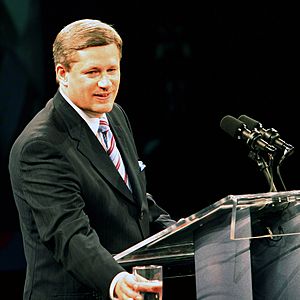
In July 2019, a group of independent academics published an assessment of past prime ministers of Canada based on the number of campaign pledges and promises fulfilled. According to the study, the Harper government fulfilled 85 per cent of its pledges (including partially-completed pledges). When factoring only completed, realized pledges, the Harper's government, in their last year, kept 77 per cent of promises. The study found that the governments led by Harper, in addition to the government led by his successor, Justin Trudeau, had the highest rates of follow-through for campaign promises of any Canadian government in the last 35 years.
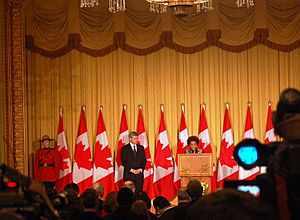
Domestic and economic policy
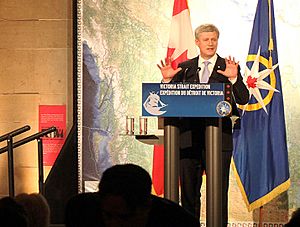
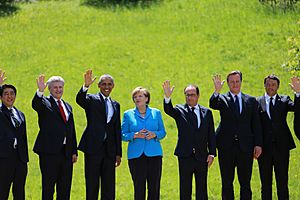
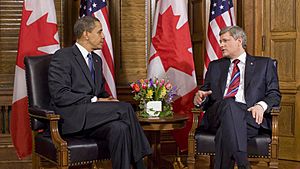
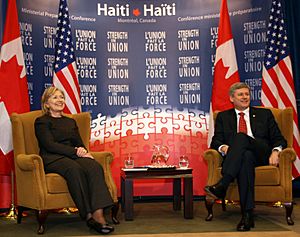
Constitutional issues
After sidestepping the political landmine for most of the first year of his time as prime minister, much as all the post-Charlottetown Accord prime ministers had done, Harper's hand was forced to reopen the Quebec sovereignty debate after the opposition Bloc Québécois were to introduce a motion in the House that called for recognition of Quebec as a "nation". On November 22, 2006, Harper introduced his own motion to recognize that "the Québécois form a nation within a united Canada." Five days later, Harper's motion passed, with a margin of 266–16; all federalist parties, and the Bloc Québécois, supported it.
In 2004, Harper said "the Upper House remains a dumping ground for the favoured cronies of the prime minister". Between 2006 and 2008, by which time Harper was prime minister, he did not put any names to the governor general for appointment to the Senate, resulting in 16 Senate vacancies by the October 2008 election. The one exception was Michael Fortier. When Harper took office, he advised the governor general to appoint Michael Fortier to both the Senate and the Cabinet, arguing the government needed representation from the city of Montreal. Although there is a precedent for this action in Canadian history, the appointment led to criticism from opponents who claimed Harper was reneging on his push for an elected Senate. In 2008, Fortier gave up his Senate seat and sought election as an MP, but was defeated by a large margin by the incumbent Bloc Québécois MP.
After the October 2008, election, Harper again named Senate reform as a priority. By December, he recommended the appointment of 18 senators and, in 2009, provided an additional nine people for appointment as senators. Many of those appointed had close ties with the Conservative Party, including the campaign manager of the Conservative Party, Doug Finley. Critics accused Harper of hypocrisy (the Liberals coined the term "Harpocrisy"). Conservative senator Bert Brown defended Harper's appointments and said "the only way [the Senate]'s ever been filled is by having people that are loyal to the prime minister who's appointing them".
Economic management
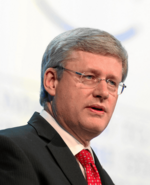
During Harper's tenure, Canada had budgetary surpluses in 2006 and 2007 of $13.8 and 9.6 billion respectively. Following the 2008 financial crisis, Canada ran deficits from 2008–2013. The deficit was $55.6 billion in 2009 and was gradually lowered to $5.2 billion in 2013. In 2014, the federal budget was balanced with a surplus of $1.9 billion. For the first 11 months of the 2015–2016 period, the federal government was on track for a $7.5 billion surplus. For 2015–2016, the federal government projected a $1.4-billion surplus. Following the 2015 federal election and a change in government, the 2015 fiscal year ended in a $1 billion deficit instead. In 2010, Canada had the lowest debt-to-GDP ratio in the G7 economies. The Economist magazine stated that Canada had come out the recession stronger than any other rich country in the G7. In 2013, Canada came out with Global Markets Action Plan to generate employment opportunities for Canadians.
2011 Census
Ahead of the Canada 2011 Census, the government announced that the long-form questionnaire (which collects detailed demographic information) will no longer be mandatory. According to Minister of Industry Tony Clement, the change was made because of privacy-related complaints and after consulting with Statistics Canada. However, the federal privacy commissioner reported only receiving three complaints between 1995 and 2010, according to a report in the Toronto Sun.
Munir Sheikh, the chief statistician of Canada—appointed on Harper's advice—resigned on July 21, 2010, in protest of the government's change in policy. Ivan Fellegi, a former chief statistician, criticized the government's decision, saying that those who are most vulnerable (such as the poor, new immigrants, and aboriginals) are least likely to respond to a voluntary form, which weakens information about their demographic.
The move was opposed by some governmental and non-governmental organizations. Federation of Canadian Municipalities; the Toronto government; Canadian Jewish Congress; Evangelical Fellowship of Canada; Canadian Conference of Catholic Bishops; Canadian Medical Association; Statistical Society of Canada; the American Statistical Association; and Registered Nurses Association of Ontario all opposed the change. However, the Fraser Institute supported the change. The provincial governments of Ontario, Quebec, New Brunswick, Prince Edward Island, and Manitoba, also opposed the change.
Veterans
Under Harper, the annual budget of Veterans Affairs Canada increased from $2.85 billion in 2005–2006 to $3.55 billion in 2014–2015, while the quantity of veterans served has declined from 219,152 in 2008–2009 to 199,154 in 2015. Nine Veterans Affairs offices were closed between 2012 and 2015, and 900 positions were phased out from the department since 2009. Former-minister of veterans affairs Erin O'Toole stated that the closures were made to modernize the department, by moving services online and to Service Canada locations. In 2006, Harper implemented the New Veterans Charter passed with all party support by the previous Liberal government. This charter gave veterans the option to select a lump-sum payment, an annual installment over the number of years of a Veteran's choosing, or a combination of these two payment options. Under Harper, the Canadian government spent $700,000 fighting a class-action lawsuit brought by a group of wounded Afghan veterans who argued that the new charter was discriminatory.
Environmental policy
Since Harper's government took office in 2006, Canadian greenhouse gas emissions fell from 749 to 726 Mt of carbon dioxide equivalent (CO2 eq). From 1993 until 2006, during the previous Liberal government greenhouse gas emissions increased from 600 to 749 Mt of CO2 eq. The reduction corresponded Canada's decreased economic output during the Great Recession and emissions began increasing slightly in 2010, when the economy began recovering. Other significant factors in Canada's decreased emissions during Harper's tenure are initiatives such as the carbon tax in British Columbia, the cap and trade system in Quebec, Ontario discontinuing use of coal-fired power plants, and the Clean Air Regulatory Agenda which regulates emissions for automobiles and light trucks. In 2006, a Clean Air and Climate Change Act was proposed to address air pollution as well as greenhouse gas emissions; it never became law. In 2006, the Clean Air Regulatory Agenda (CARA) was established to "support Government of Canada efforts to reduce greenhouse gas (GHG) and air pollutant emissions in order to improve the environment and health of Canadians". In December 2011, the Harper government announced that Canada would formally withdraw from the Kyoto Protocol. Environment Minister Peter Kent stated, "It's now clear that Kyoto is not the path forward for a global solution to climate change." In December 2012, Canada became the first signatory to formally withdraw from the Kyoto Protocol.
Renewable energy
Other federal initiatives include the 2011 loan guarantee towards the Lower Churchill Project in Labrador, which is scheduled for completion in 2017. The Lower Churchill's two hydroelectric installations at Gull Island and Muskrat Falls will have a combined capacity of over 3,074 MW and have the ability to provide 16.7 TW·h of electricity per year, which is enough to "reduce greenhouse gas emissions equivalent to taking 3.2 million vehicles off the road each year".
Public transit
In 2006, Harper introduced a Public Transit Tax Credit, where individuals could claim 15 per cent of the cost of a transit pass each year. From 2006 to 2013, the Harper government invested over $5 billion towards public transit projects in Canada. In 2006, the federal government provided $697 million towards the Toronto York–Spadina Subway Extension. In September 2013, Finance Minister Jim Flaherty announced a federal contribution of $660 million towards the Scarborough Subway Extension.
Transparency
Starting in 2006, the Harper government implemented policies that had the effect of reducing transparency. During this government, scientists employed by the government were not able to speak with the media and inform the public of their findings without government permission, the government made significant cuts to research and other forms of data collection, and significant destruction and inaccessibility of government-held data and documents occurred.
During the Harper government, it was not possible for government-employed scientists to openly speak about the government policy that prohibited communication with the media. However, following the election of a new government in 2015, several scientists who were or had been employed by the government came forward to confirm the allegations made by anonymous sources during the Harper years.
The government made drastic cuts to scientific research and data collection. Over 2,000 scientists were dismissed and funding was cut from world renowned research facilities. Cuts were also made to many essential programs, some so deep that they had to shut down entirely, including the monitoring of smoke stack emissions, food inspections, oil spills, water quality, and climate change. During this time, the long form census was also discontinued as a mandatory part of the census. This was ostensibly due to privacy concerns, however, the number of complaints about privacy proved to be minimal.
The government closed a number of government libraries without consultation on the closings or the process involved. The manner in which it was done received significant criticism because it left the remaining information in disarray, inaccessible for research.
Supreme Court appointments
Harper chose the following jurists to be appointed as justices of the Supreme Court of Canada:
- Marshall Rothstein (March 1, 2006 – August 31, 2015)
- Thomas Cromwell (September 5, 2008 – September 1, 2016)
- Andromache Karakatsanis (October 21, 2011 – present)
- Michael J. Moldaver (October 21, 2011 – September 1, 2022)
- Richard Wagner (October 5, 2012 – present)
- Clément Gascon (June 9, 2014 – September 15, 2019)
- Suzanne Côté (December 1, 2014 – present)
- Russell Brown (August 31, 2015 – June 12, 2023)
Conservative backbencher (2015–2016)
Harper returned to Ottawa as a Conservative backbencher and addressed a meeting of the Conservative caucus that included defeated MPs in November 2015. Interim leader Rona Ambrose stated that Harper would be in the House for key votes as the member for Calgary Heritage, but had earned the right to keep a low profile after his service as the prime minister. In February 2018, Harper stated that he could have still "easily" been leader of the Conservative Party, but he chose not to amass too much power in order to secure the party's fortunes in the future.
In December 2015, Harper had set up Harper & Associates Consulting Inc., a corporation that lists him a director alongside close associates Ray Novak and Jeremy Hunt.
Harper announced in May 2016 that he planned to resign his seat in the House of Commons during the summer before the fall session of Parliament. On May 26, 2016, he was named as a board member for the Conservative Party's fundraising arm. The Conservative Fund is noted to have influence on the party operations. Harper and other directors played a role in the removal of Harper–appointed Conservative executive director Dustin Van Vught to avoid backlash from donors and grassroots conservatives. In the same month, Harper delivered a speech to the 2016 Conservative Party convention where his accomplishments as party leader and prime minister were honoured by the party.
After politics (2016–present)
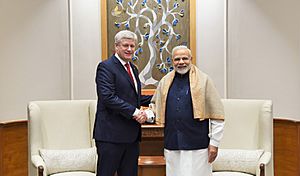
On July 25, 2022, Harper endorsed his former cabinet minister Pierre Poilievre for the leadership of the Conservative Party. This was the first time Harper endorsed a federal Conservative leadership candidate; he previously chose not to in the 2017 and 2020 leadership elections.
In September 2022, Harper attended Queen Elizabeth II's state funeral, along with other former Canadian prime ministers.
On March 22, 2023, during a conservative conference in Ottawa, Harper criticized the Trudeau government's handling of alleged Chinese interference in Canadian elections. He also criticized the NDP, calling them a "branch plant of the Liberal party" and argued that the party got "nothing" out of its confidence-and-supply agreement with the Liberal Party.
In April 2023, Harper endorsed Albertan Premier Danielle Smith for the 2023 Albertan provincial election.
In July 2023, Harper stressed the need for stronger ties between the Hungarian government and centre-right political parties.
Honours
| Ribbon | Description | Notes |
| Companion of the Order of Canada |
|
|
| Member of the Alberta Order of Excellence |
|
|
| Queen Elizabeth II Golden Jubilee Medal for Canada |
|
|
| Queen Elizabeth II Diamond Jubilee Medal for Canada |
|
|
| Alberta Centennial Medal |
|
Harper received the Woodrow Wilson Award on October 6, 2006, for his public service in Calgary. The awards ceremony was held at the Telus Convention Centre in Calgary, the same place where he made his victory speech.
Time magazine also named him as Canada's Newsmaker of the Year in 2006. Stephen Handelman wrote "that the prime minister who was once dismissed as a doctrinaire backroom tactician with no experience in government has emerged as a warrior in power".
On June 27, 2008, Harper was awarded the Presidential Gold Medallion for Humanitarianism by B'nai B'rith International. He is the first Canadian to be awarded this medal.
On July 11, 2011, Harper was honoured by Alberta's Blood tribe. He was made Honorary Chief of the Kainai Nation.
On September 27, 2012, Harper received the World Statesman of the Year award. This award was offered through a US group of various faith representatives. This occurred at a black tie banquet in New York. Jean Chrétien was one of the previous recipients from Canada.
In August 2016 President Petro Poroshenko of Ukraine awarded Stephen Harper with the highest award for foreigners–the Order of Liberty.
In December 2019, it was announced by Governor General Julie Payette that Harper had been appointed as a Companion of the Order of Canada. He was formally invested on September 18, 2022, by Governor General Mary Simon in London in a ceremony attended by incumbent Prime Minister Justin Trudeau, and former prime ministers Kim Campbell, Jean Chrétien, Paul Martin and former Governors-General Michaëlle Jean and David Johnston.
In 2023, he was appointed a Member of the Alberta Order of Excellence, the province's civilian honour for merit.
Honorary degrees
- Honorary degrees
| Location | Date | School | Degree |
|---|---|---|---|
| January 22, 2014 | Tel Aviv University | Doctor of Philosophy (Ph.D) |
Personal life
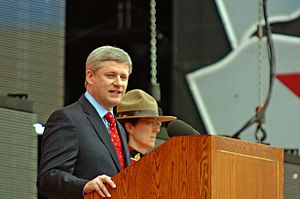
Harper married Laureen Teskey on December 11, 1993. Laureen was formerly married to New Zealander Neil Fenton from 1985 to 1988. The Harpers have two children: Benjamin and Rachel. Harper is the third prime minister, after Pierre Trudeau and John Turner, to send his children to Rockcliffe Park Public School, in Ottawa.
In the late 1980s, he became an evangelical Christian, a member of RockPointe Church (Christian and Missionary Alliance) in Bearspaw, a suburb of Calgary, Alberta. After moving to Ottawa in 2003, he became a member of East Gate Alliance Church.
An avid follower of ice hockey, he has been a fan of the Toronto Maple Leafs since his childhood in the Leaside and Etobicoke communities in Toronto. Harper is also a fan of the Calgary Flames. He published a book, A Great Game: The Forgotten Leafs and the Rise of Professional Hockey (2013), which chronicles the growth of professional hockey, particularly in Toronto, and writes articles occasionally on the subject. Harper appeared on The Sports Network (TSN) during the broadcast of the Canada–Russia final of the 2007 World Junior Ice Hockey Championships. He was interviewed and expressed his views on the state of hockey and his preference for an overtime period in lieu of a shoot-out. In February 2010, Harper interviewed former National Hockey League greats Wayne Gretzky and Gordie Howe for a Saskatoon Kinsmen Club charity event.
Harper had a cameo appearance in an episode of the television show Corner Gas, which aired March 12, 2007. He owns an extensive vinyl record collection and is a fan of The Beatles and AC/DC. In October 2009, he joined Yo-Yo Ma on stage in a National Arts Centre gala and performed "With a Little Help from My Friends". He was also accompanied by Herringbone, an Ottawa band with whom he regularly practices. He received a standing ovation after providing the piano accompaniment and lead vocals for the song.
In October 2010, Harper taped a cameo appearance in an episode of the television show Murdoch Mysteries, which aired July 20, 2011, during the show's fourth season.
He was the first prime minister to employ a personal stylist, Michelle Muntean, whose duties range from coordinating his clothing to preparing his hair and makeup for speeches and television appearances. While she used to be on the public payroll, she has been paid for by the Conservative Party since "some time [in] 2007".
As of 2013, the Harper family had two cats, Stanley and Gypsy. They have fostered other cats as well.
Electoral record
See also
 In Spanish: Stephen Harper para niños
In Spanish: Stephen Harper para niños
- 28th Canadian Ministry The Harper cabinet
- List of prime ministers of Canada
- List of prime ministers of Elizabeth II
- Canada–United States softwood lumber dispute
- Conservative Party of Canada
- Reform Party of Canada
- Canadian Alliance
- Conservatism in Canada
- Canada's Global Markets Action Plan


